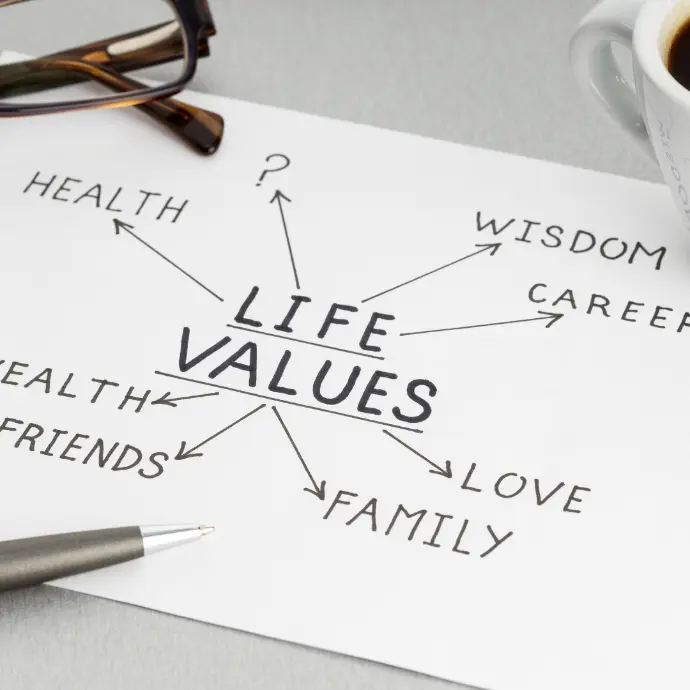“Success is liking yourself, liking what you do, and liking how you do it.”
Maya Angelou
Values or paycheck: which wins daily?
Last week, I watched a brilliant marketing executive I am coaching, let’s call her Olivia, struggle to hold back tears. "The company walls are plastered with posters about respect and integrity," she whispered, "but in our leadership meetings, we make decisions that completely contradict them." Her sleepless nights weren't just about workload; they stemmed from a profound sense of betrayal. The core values her company proudly displayed in the lobby had become meaningless words while she, as a sole provider for her family, felt trapped in this theater of hypocrisy.
This disconnect isn't unique to Olivia. It is the most common thread running through the fabric of stories I hear in my coaching practice, the painful gap between what companies say they value and what they actually reward.

The Empty Promise of Corporate Values.
"Respect. Integrity. Innovation. Customer-first." These words adorn corporate websites, employee handbooks, and onboarding presentations. They are proudly referenced in all-hands meetings and annual reports. Yet for many leaders I coach, these same values become a source of deep disillusionment.
Recent workplace studies reveal that 76% of companies have formal value statements, yet only 27% of employees believe these values actually guide decision-making. This disconnect creates a particular form of distress psychologists call "values incongruence", a significant predictor of burnout, anxiety, and depression.
One mid-level manager described it perfectly: "It feels like gaslighting. They tell us people are our greatest asset while treating us like replaceable parts. I am constantly questioning my own perception of reality."
The Physical and Emotional Toll of Corporate Doublespeak.
When a finance director, let’s call him James, with twenty years of experience, came to our first coaching session, he described physical symptoms that had baffled multiple doctors, chronic headaches, digestive issues, and debilitating insomnia. "My company's first value is 'We care about our people,' but last quarter, we laid off an entire department via email to meet numbers. I was required to defend this decision to my team with corporate talking points I didn't believe in myself." James’ body was keeping score of every compromise.
For those with families depending on their income, this creates an impossible bind. As another client put it, "I am trading my wellbeing for financial stability, but eventually, there won't be enough of me left to enjoy the security I have sacrificed everything to provide."
Research confirms that this value conflict physically manifests in elevated cortisol levels, disrupted sleep patterns, and compromised immune function. Many leaders describe Sunday evening anxiety that has evolved into full-blown panic attacks as Monday morning approaches.

The Broken Promise That Hurts the Most.
Through hundreds of coaching conversations, I have discovered that the value disconnect around "respect" cuts the deepest. Companies proudly proclaim they respect their employees while simultaneously implementing surveillance software, dismissing feedback, making unilateral decisions affecting thousands of lives, and treating emotional exhaustion as a performance issue.
Jennifer, a human resources executive, shared how her company launched a mental health initiative while simultaneously reducing headcount, leaving remaining team members with unsustainable workloads. "I am the face of this program," she told me, "but I feel like a fraud promoting wellbeing resources to people who simply need reasonable expectations and adequate staffing."
This contradiction doesn't just damage trust, it fundamentally alters how people view themselves as professionals and human beings. The internal dialogue becomes toxic: "Am I complicit? Have I become what I once criticized? What example am I setting for my children when I talk about integrity at home but compromise daily at work?"
Finding Footing When the Ground Keeps Shifting.
Having navigated this territory myself before becoming a leadership coach, I have witnessed several approaches that help leaders maintain their sense of self while working within systems that challenge their values:
- Document the dissonance. Many clients find relief in simply acknowledging the gap between stated and actual values. One executive keeps a private journal documenting contradictions between company proclamations and actions. This practice prevents gaslighting and maintains clarity about reality.
- Advocate strategically. Choose specific instances where you can push back against value incongruence without jeopardizing your position. A marketing director I coach successfully challenged a misleading campaign by framing his concern in terms of brand reputation and long-term customer trust, speaking the language of business outcomes while honoring his personal values.
- Create a values microclimate. Even in toxic organizational cultures, you can establish different norms within your immediate sphere of influence. A team leader implemented transparent communication practices with her direct reports, creating a pocket of authenticity amidst broader dysfunction.
- Build a personal board of directors. Develop relationships with mentors and peers who share your values orientation. These connections provide perspective, validation, and strategic counsel when navigating difficult decisions.
- Set recovery rituals. Several clients establish clear boundaries between work and home to prevent value conflicts from consuming their entire identity. One executive changed clothes immediately upon arriving home, symbolically leaving his "corporate self" at the door.
- Develop your runway. If the dissonance becomes truly untenable, begin building options methodically. This might mean acquiring new skills, strengthening your network, or adjusting finances to create more flexibility. Having a path forward alleviates the trapped feeling that intensifies distress.
The Quiet Revolution of Authenticity.
What gives me hope is witnessing leaders who, despite these challenges, are quietly transforming their organizations from within. By embodying genuine values, even in small ways, they create ripple effects that gradually shift culture.
A finance leader I coached refused to use euphemisms during necessary restructuring, communicating with remarkable honesty about difficult decisions. His team, though facing challenging circumstances, reported greater trust and resilience than departments managed with corporate platitudes.
Organizations are ultimately collections of human beings, and authentic humans eventually influence systems. Your commitment to living values genuinely, even when your company doesn't, contributes to this larger evolution.
You are Not Imagining It.
If you have felt the painful disconnect between what your company claims to value and how it actually operates, know this: you are not overly sensitive, you are not imagining things, and you are certainly not alone.
The dissonance you experience is a natural response to an unnatural situation. Your discomfort isn't weakness, it is evidence that your moral compass remains intact despite organizational pressure to normalize contradiction.
The path forward begins not with dramatic gestures but with small reclamations of authenticity. Where can you create alignment between values and actions within your sphere of influence today?
Always remember this.
If you are navigating the painful gap between corporate values statements and workplace reality, remember that this struggle doesn't define your professional worth. Your integrity matters, even when it feels like the organization has abandoned its own.
What are Core Values?
A core value is a principle or belief that a person or organization views as being of central importance.
What are the 4 main Core Values?
The 4 main Core Values are: Truth, Respect, Responsibility, Compassion.
What are the 5 Workplace Core Values?
A vital workplace is built on five core values: Compassion, Accountability, Healthy Competition, Personal Growth & Wellness, and Equality. When you choose the values that will guide your workplace, it is essential to consider the purpose behind those values.
What are the 5 Core Human Values?
The five universal Human Values of Love, Truth, Right Conduct, Peace and Non-violence encompass all the noble values, have endless depth and breadth in their beauty, purity and power, and lie within every human being in full measure, largely hidden from conscious awareness like diamonds inside a mountain.
Moving forward together.
When you feel it is time to explore this challenge further, please let me know. I am a Master Certified Coach with the International Coaching Federation, specialized in helping leaders find their authentic leadership voice and I would be honored to explore this important topic further with you.
Note: all names and identifying details in this article have been changed to protect client confidentiality in accordance with the ICF Code of Ethics.

book a call